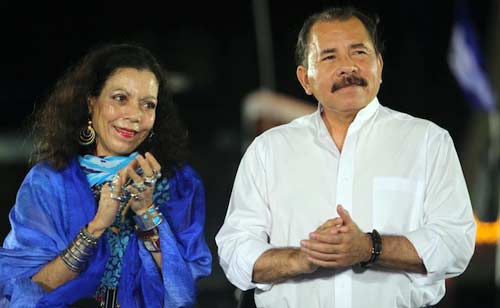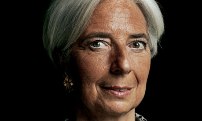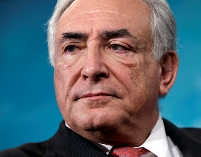- Les Blough, Editor
Axis of Logic
Axis of Logic
In overwhelmingly adverse global economic conditions, President Daniel Ortega and his colleagues have stubbornly implemented an extraordinarily successful economic policy. In just seven years since January 2007, they have made good the irremediable defects of the hopeless Western development model based on dribbles of aid, unfair trade and mountains of debt. On December 13th, the International Monetary Fund published what amounted to a grudging acknowledgement of Nicaragua's achievement. But the IMF's remarks ignore key aspects of Nicaragua's overall economic policy.
The omission of such fundamental changes with such dramatically positive results from supposedly authoritative evaluations like those emitted by the IMF, as well as supposedly progressive NGOs, clearly merits a closer look. IMF functionaries seem to maintain continuing mystical faith in the discredited neoliberal policies first applied to the majority world and now devastating people in the US and Europe. Understanding the irrational prejudices of the Western economic managerial and academic classes in general requires both a look at contemporary history and a consideration of the Western elites' disproportionate control of global markets Relevant contemporary history Three generations ago, Nazi Germany shocked people in Europe by applying to them the genocidal colonial methods Europeans used over centuries to subjugate the Americas, Africa, Asia and the Pacific. After 1945, those same methods were applied by the victorious Western powers either directly or by proxy in Palestine, Korea, Vietnam, Algeria, throughout Africa and in many other countries. During that same period the US and European economic and political authorities accompanied their sadistic military aggression with ruthless neocolonial policies to ensure continued Western economic and political dominance over the majority world. Now, the Western oligarchic elites are shocking current generations in Europe by applying to them more or less the same neocolonial economic policies used to subjugate the rest of the world since 1945. Faced with relentless competition from resurgent global competitors like Russia and China, that is one way the North American and European elites continue unjustly extracting wealth and concentrating power. Another more traditional way has been to unleash vicious military aggression against recalcitrant majority world targets resisting Western economic coercion, as happened in Ivory Coast, Libya and as is still happening in Syria. Western corporate elites mobilized tens of trillions of US dollars to save their corporate-controlled economic system from bankruptcy. Genocidal criminals that they are, they cannot find a few hundred billion US dollars to end world hunger or mitigate clearly human-provoked climate change. This context renders nonsensical and odious continuing claims by Western governments, non-governmental organizations and media to any kind of moral or intellectual superiority over the rest of the world. Their cynicism and hypocrisy runs across the whole Western political spectrum.
The IMF, some background
Despite occasional disagreements, those classes share many basic assumptions with their non-governmental counterparts in the North American and European aid and development industry. Nor is it any surprise that this global system of economic group-think encompasses a large number of majority world economists, trained in the West. Between 2000 and 2007, the IMF lost much of its influence because many majority world country members, albeit with tiny voting rights within the IMF, rejected its policies. The 2008 Western financial crisis revived IMF influence, but without changing its underlying, ingrained prejudices. Through 2013, the IMF has been obliged to acknowledge the severe depression in Greece resulting from the ill-named “rescue” program it applied jointly, with the European Union. Its excuses have varied over the last twelve months between technical references to fiscal multipliers and straightforward admissions that the IMF's hopeful growth estimates for the Greek economy were absurdly wrong.
Kohl was forced from office over financial funding scandals that badly damaged the credibility of his Christian Democratic Union party. His fall paved the way for the rise to power of Angela Merkel. All these events demonstrate that cleanliness in the chronically corrupt, failed Western political and financial system is necessarily relative. As in the Watergate scandal or those of 2008 in the US , plenty of powerful people in Europe have been relieved to escape questions about what they knew about the crimes of fallen idols, like Helmut Kohl or, more recently, Silvio Berlusconi, and when they knew it. All this background renders self-evident that Western-dominated international financial institutions are subordinate to the political needs of the oligarchic North American and European elites. This fundamental reality explains the
In the United States through 2008, the Federal Reserve and the Treasury mobilized around US$12 million million to rescue North American and, also, European banks. In Europe, attention has focused on the €1 million million rescue the European Central Bank mobilized to rescue European banks in 2011. But the ECB intervention actually started four years earlier in the summer of 2007. Back then, the ECB made available the equivalent of US$50 thousand million to help what they insisted, wrongly, was a short-term liquidity problem in Europe's banking system. But by early 2008 it was evident even to non-economists that the likely root of the crisis was the strong risk of chronic insolvency of major institutions in the Western financial system. Sinister, cynical and determined, the ECB defended the power of Europe's corporate oligarchs by promoting the transfer of that risk to the public sector of EU member countries, thus deepening the crisis throughout Europe. That crisis itself expresses the single underlying contradiction driving events in Western economies since the break up of the Soviet Union and before. That is the increasing inability of the Western economies to sustain their undeserved accustomed prosperity through unjust neocolonial terms of trade and predatory access to natural resources imposed on the majority world before and after the Second World War. The prosperity of the United States and Western Europe has always largely depended on that advantage, one inherited from centuries of slavery and colonial pillage, now playing out in Africa and West and Central Asia. The Federal Reserve – more background A vital component of that advantage has been strong North American and European control of global monetary policy. In that regard, complex conspiracy theories are superfluous. Western financial institutions are very open about the mechanisms they use to rig international markets. For example, the minutes of the Federal Open Market Committee for October 29th-30th read, somewhat tediously, as follows:
Those minutes should be read bearing in mind the relationship between the Federal Reserve and its network of Primary Dealer banks. These privileged financial entities include persistently recidivist prestigious institutions regularly subject to penal fines for dishonest dealing. Among those institutions figure, for example, JP Morgan, Citigroup, Barclays, HSBC, Desutsche Bank, Goldman Sachs, BNP Paribas, Merrill Lynch and Morgan Stanley, among several others.
For example, on March 1st 2013, Simon Potter, Executive Vice President of the most powerful member bank of the Federal Reserve, the New York Federal Reserve Bank, offered the following “Remarks at the Annual Meeting with Primary Dealers” in New York City.
Obviously, those remarks are meant for public consumption. Potter gives the disingenuous impression that such meetings are important for communication between high level functionaries like himself and his counterparts in global international financial corporations. In fact, apart from routine phone conversations, rounds of golf, games of squash or badminton, or dinner engagements, a plethora of other formal and informal means exist serving to coordinate action between government, Central banks and private corporations, as required. The extensive and deep global relationships shaping Western elite financial policy management are at once absolutely clear in outline and deliberately opaque in practice. The style and substance of that policy management transmits power from governments and Central Banks to the corporate financial sector, facilitating ruthless corporate manipulation of world financial and commodity markets. In its turn, that indisputable reality profoundly affects small countries like Nicaragua which, under current global conditions, depend heavily on foreign investment to sustain their economies.
Nicaragua Western domination of the IMF has encouraged countries strong enough to do so to set themselves free from IMF tutelage. In Latin America, among the countries to have done so most emphatically are Venezuela, Argentina, Ecuador and Brazil – all countries with abundant natural resources to underwrite their autonomy. In Nicaragua's very different and much more vulnerable case, the incoming Sandinista administration in 2007, led by Daniel Ortega, inherited an IMF program from the country's previous right wing government. President Ortega and his economic team deftly incorporated that existing IMF program into an economic strategy far more broadly based than the IMF's own myopic neoliberal agenda. Despite sporadic differences of opinion, over, for example, Venezuelan development cooperation, public sector remuneration and social security reform, Nicaragua successfully completed the IMF program inherited from 2006 and also a subsequent IMF Extended Credit Facility ending in 2011. Through 2012 and 2013, Nicaragua continued to engage successfully with the IMF. This in turn has enabled the country to access favourable terms of credit and to attract record levels of foreign investment. The IMF's remarks in its December 13th press release on its recent Article 4 consultations constitute a very grudging and in some respects disingenuous recognition of Nicaragua's turn around since 2007. The IMF sees Nicaragua enjoying both stability and growth for the next few years at levels similar to those since 2011. The official press release notes that deficit spending is well within reasonable levels in relation to gross domestic product. The IMF officials “welcomed Nicaragua’s stable macroeconomic condition despite the weak global environment.” That simple sentence is loaded with meaning. It embodies both what the IMF is bound to say and also the omissions of what the IMF finds inconvenient to say. An uncharitable summary of those omissions might well be that the revolutionary Sandinista government and its ALBA allies make other countries look inept. Poverty reduction is supposed to be a guiding principle for the IMF but poverty reduction and redistribution of wealth are mentioned just once in the IMF's press release, as an aspiration rather than as an achievement. In fact, extreme poverty in Nicaragua has been reduced to around 7% of the population from over 20% in 2007. Nor does the IMF note, for example, the dramatic switch in the composition of Nicaragua's sources of electricity generation which are now well over 50% from renewable sources as against less than 20% in 2006. Record activity in terms of exports, tourism, road and port infrastructure investment, which might also be expected to receive mention, in fact do not. By contrast the IMF's remarks lay heavy stress on potential risks from falling global demand for Nicaraguan exports despite the fact that the authorities in Europe and the United States talk continually, albeit without great conviction, about their economies' recovery. As so often, tell tale remarks in relation to the periphery reveal a great deal about what goes largely unsaid in the metropolis.
A fairer way of putting the IMF admonitions about possible external shocks would be to say “Although Nicaragua has managed past external shocks better than its neighbours, serious potential risks remain.” Another tell tale sign of the sub-text to the IMF's December 13th Press Release is the nature of its references to “oil-related financing from Venezuela”. The IMF notes that “the terms and levels of the economic cooperation with Venezuela could change” and suggests “uncertainties regarding the global outlook and the oil import financing scheme with Venezuela”. Finally it recommends “full disclosure of the oil import financing agreement with Venezuela”. The extraordinary omission here is the fact that Nicaragua is a member of the Bolivarian Alliance of the Americas and of Petrocaribe, two related frameworks involving almost every country in Central America and the Caribbean. So the relationship with Venezuela is far more complex than an “oil import financing scheme”. That perplexing omission by the IMF tips over into downright falsehood with the suggestion that the Nicaraguan authorities fail to disclose adequate information about Venezuela's development cooperation. In fact, the relevant mixed venture company (ALBANISA) and the financial institution administering ALBA and Petrocaribe related development cooperation funds (CARUNA) are both subject to strong reporting requirements by Nicaragua's Central Bank and other financial authorities. Likewise, both entities are accustomed to making detailed presentations to the National Assembly's Economic Commission. So it is completely untrue to suggest some failure of disclosure in relation to that development cooperation. Doing so confirms that the IMF's positive remarks on Nicaragua are indeed grudging in the sense that they implicitly acknowledge the stability provided by ALBA and Petrocaribe but, rather than a region wide framework, talk about a “scheme” lacking “full disclosure”. This ideologically driven slant also explains the IMF's weird omissions and its insistence on possible short term risks. Similarly, the IMF's Executive Board recommendations are truly perfunctory given the dramatic changes in Nicaragua in the last year and a half. Among those changes are the recovery of around 90,000 square kilometres of maritime territory unlawfully usurped by Colombia and ground-breaking, broadly consulted reforms to Nicaragua's Constitution. Furthermore, there is the consensus already worked out to stabilize the Social Security system scheduled for implementation in January next year. Likewise inexplicable is the IMF's failure to mention the decision to proceed with plans for ten major infrastructure projects, including the probable construction of an Inter-oceanic Canal. Apart from those changes, Nicaragua's underfunded but human-resource-rich socialist model also controlled a potentially devastating outbreak of dengue fever that affected the whole of Central America this year. Similarly, in 2013 important provisions of the somewhat controversial Agreement of Association with the European Union also came into effect. IFIs and NGOs The IMF's omission of these absolutely fundamental elements faithfully reflects the myopic and selective focus of the officials from the various International Financial Institutions who regularly flit from one country to another. At each stop, they mull over macroeconomic data for a few days at a time before heading back to the narcissistic bubble of their Washington office to emit their influential verdicts, almost always irredeemably superficial and heavily ideologically biased. That culture so typical of the International Financial Institutions is also typical of non governmental organizations in the sector of development aid.
Henry is a former Chief Economist with the prestigious US McKinsey Consultancy Corporation but is currently working for an NGO called the Tax Justice Network. He has a strong relationship with one of the leading US private universities, Tufts University, where has has had two fellowships. One of these was with Tufts' corporate-friendly Fletcher School of Law and Diplomacy, which writes of itself : “Since 1933, The Fletcher School has prepared the world's leaders to become innovative problem-solvers in government, business and non-governmental organizations with strategic cross-sector networks.” So Henry is very representative of the mercenary expertise of both the corporate sector managerial classes and their NGO counterparts. Two aspects are interesting about the absurd counterfactual opinions expressed in Henry's remarks to the Real News Network. Firstly, the interview confirms the role of the Real News Network and similar supposedly alternative media outlets like Democracy Now, Z, or Counterpunch as part of the reproductive machinery of Western liberal and social democrat corporate-financed opinion, of which, recently, Glenn Greenwald has been the most prominent exponent. The second aspect, a corollary of the first, is that alternative media often reinforce mainstream imperialist media propaganda from an apparently contradictory perspective. So, for example, the combined effect of mainstream coverage of the IMF's faint praise for Nicaragua plus James S Henry's blatantly counterfactual nonsense in an alternative media outlet is indeed one of mutual reinforcement. Both are examples of intellectual production totally ignoring the dramatic revolutionary change undertaken by Nicaragua's government led by President Daniel Ortega and Rosario Murillo. Networking Fake News At once cynical and idiotic, Henry's remarks on the Real News Network bear out this analysis. In fact as Jorge Capelán has already pointed out, Henry manages to pack more disinformation into one brief interview than Nicaragua's opposition media manage to communicate in months of venomous anti-Sandinista coverage. As Capelán also observes, Henry's anti-Sandinista attack derives directly from the wretchedly false and unsuccessful arguments of Nicaragua's political opposition, who for over a year now have been unable to muster more than around 10% support in national opinion polls. Henry gives himself an unconvincing progressive gloss by talking about President Daniel Ortega as “turning to the right”, seeking “to replace the subsidies he's gotten from Venezuela ... using his supermajority in the national congress to go for reforms of 39 articles out of the 1995 Nicaraguan Constitution" . so as to “overcome the ban on running for office more than two terms. He's already since violated that.” Let us stop there after just two paragraphs.
Likewise Nicaragua does not have a “1995 Constitution”. Nicaragua's Constitution dates from 1987 based on a nationwide consultative process including the country's Caribbean Coast. In 1995, the politically centre-right social democrats, with whom James S Henry clearly sympathizes, hijacked the National Assembly and railroaded through constitutional reforms designed to exclude both the FSLN and the country's then effective First Minister Antonio Lacayo, son-in-law of then President Violeta Chamorro. Those reforms were not consulted with anybody and violated the fundamental principle of equality embodied in Nicaragua's 1987 Constitution. In any case, the main objective of the 1995 reforms was to eliminate re-election altogether, including even for a second term. So it is the most ignorant nonsense on James' part to talk about a non-existent ban on running for more than two terms which President Ortega is supposed to have “violated”. President Ortega has acted scrupulously by the letter and spirit of Nicaragua's 1987 constitution and the decisions of the Nicaraguan Supreme Court ratified by Sandinista and Liberal magistrates alike on October 19th 2009 and a few months later on March 8th 2010. Nor is it true that the FSLN has abused its majority in the legislature to ram through unpopular constitutional reforms. All sectors of Nicaraguan society were consulted including the private business sector and the relevant bodies representing Nicaragua's different religious denominations. Following those consultations, various changes were made to the original Sandinista proposals. Only then were the reforms, aimed at promoting social and political stability and deepening direct democracy, put successfully to a vote in the National Assembly. The rest of Henry's remarks are a similar mishmash of wilful ignorance, cynical selectivity and downright falsehood. He condemns plans for the proposed Interoceanic Canal which are in fact ultimately more favourable than public-private partnerships elsewhere. For example, after 50 years Nicaragua will be a majority share-holder in the Canal with full ownership in another fifty years. The Canal's projected benefits for Nicaragua easily compare well with the sovereign outcomes of similar mega-infrastructure projects, like, for example, the Channel Tunnel between Britain and France.
Nor is Henry correct to talk about an increasingly regressive tax system in Nicaragua when the tax reform of 2012 increased the starting threshold for income tax by a third from around US$3,000 to around US$4,000 for a population the majority of whom earn under USS$300 a month, while VAT stayed the same. Henry talks about Nicaragua having “the second-lowest per capita income in Latin America” which is typical statistical abracabdabra. Looked at another way, the UN's Economic Commission for Latin America and the Caribbean reckons real average income in Nicaragua in 2012 at US$107. By comparison the figures for Costa Rica, El Salvador and Guatemala are US$119, US$82 and US$95 respectively. Henry blows down three straw-men imposters, “the China dam, the authoritarian constitutional changes, and the regressive tax” to make his bizarre fake-progressive argument of a “weird reversal of policies on the part of the Ortega regime”. It certainly is true that President Ortegas' policies must look weird to someone capable of ignoring Nicaragua's dramatic poverty reduction, infrastructure transformation, vastly improved free public health and education services, greatly expanded cooperative sector and transformed position of women. Even so, Henry still has a couple of mendacious psychopathic blows below the belt to land before the Real News finally releases its viewers back into the world of sanity. He accuses the Sandinista government of “strange alliances with the church” setting back “women's rights, I think, a century”. Only derisory ignorance of Nicaragua could lead a foolish pundit like Henry to talk about “the church”. Henry may mean the Episcopal Conference of Catholic Bishops that has consistently aligned itself with Nicaragua's anti-Sandinista opposition. Or he may mean the plethora of politically diverse evangelical churches. Or he may mean Cardinal Obando y Bravo or perhaps even the Papal Nuncio with both of whom the Sandinista government enjoys excellent relations. We cannot know what Henry means because Henry is so incoherent with his own conceit he cannot explain himself. The regression in women's rights will be startling news to political parties now required by law to put up 50% women candidates for all elections. It may also surprise the women deputies who make up 40% of the legislators in Nicaragua's National Assembly. Henry's ignorant remark neglects the leading role of of brilliant women like Rosario Murillo, Supreme Court President Alba Luz Ramos (re-elected as such again this year) and Ministers like Health Minister Sonia Castro, or Minister of Government Ana Isabel Morales among numerous others. Likewise Henry seems completely unaware of the revolutionary Law 779 passed in June 2012 giving heavy statutory powers to defend women from violence both in the home, at work and in public spaces generally. For their part, Nicaraguan multi millionaire Carlos Pellas and his fellow Nicaraguan oligarchs of the Nicaraguan private business sector organization COSEP will be amused to find Henry thinks they have been “basically recruited” by President Ortega. COSEP President José Aguerrí, a persistent, albeit moderate, critic of FSLN government policies, may have some pithy observation to make on that score. In fact, COSEP, like the IMF, have been forced grudgingly to admit that President Ortega's innovative dynamic revolutionary vision has transformed Nicaraguan economic policy both at home and overseas. So what Henry foolishly describes as COSEP's “recruitment” by President Ortega is nothing more than their own acknowledgment that the FSLN's policy of inclusive economic democratization works for everyone. Business leaders recognize that the government-promoted decline in inequality is good for them too. They see what phoney experts like James S. Henry cannot. They recognize the radical transformation of their export opportunities towards new partners in Latin America, the Russian Federation, China, west and south east Asia, as well as Europe. None of that figures in Henry's hopelessly impoverished analysis.
Their business, like that of their IMF counterparts, is to suggest that if only a few regulations were tweaked and enforced and if only governments and corporations could be made to behave, then everything would be dandy under liberal free market capitalism. That is why both meretricious pundits like Henry and powerful institutions like the IMF misrepresent Nicaragua's relations with Venezuela within ALBA. It is why they both ignore half a dozen decisive structural transformations in Nicaragua's economy. It is why they refuse even to mention the radical measures of economic democratization that are rapidly increasing economic and social equality in Nicaragua. Governments, international institutions like the IMF or the World Bank and corporate and government funded NGOs like Human Rights Watch, Transparency International or the Tax Justice Network clearly collude in terms of their interventions in target countries. That collusion is a fundamental mechanism in the Western powers' global psychological warfare against formerly subjugated but increasingly autonomous peoples and governments. The Western powers and their supporters make every effort to create a false consensus so as to erode support for the governments they target and thus facilitate subsequent intervention and destabilization. Under the leadership of President Daniel Ortega, the Nicaraguan government's economic team have performed superbly well and overcome all kinds of difficulties. Perhaps in the end psychological warfare skirmishes with Western institutions, corporate media and NGO apologists amount to little more than a phoney war, in more ways than one. In Nicaragua, no one needs the approval of Western gods that failed and their inept pharisees. All they need is to be left to get on with their revolution in their own way and in their own time. (Images, captions and emphases added by Axis of Logic) Source: Tortilla con Sal |




